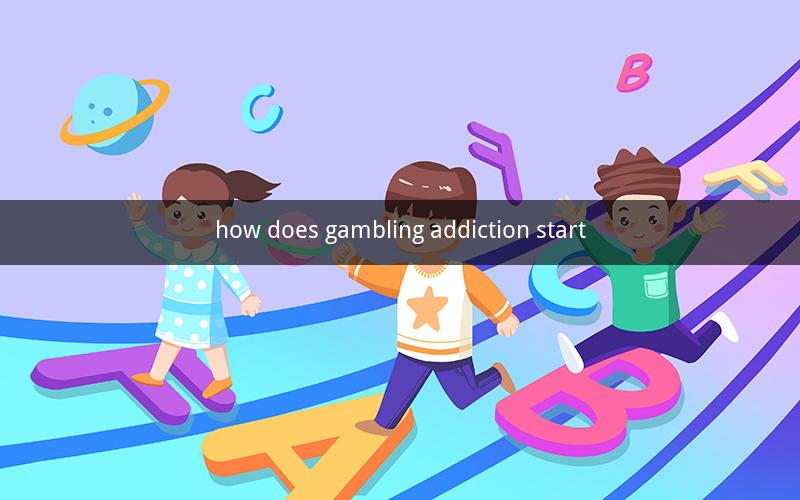
Understanding the Roots of Gambling Addiction
Table of Contents
1. Introduction to Gambling Addiction
2. Factors Leading to the Development of Gambling Addiction
1.1 Environmental Influences
2.2 Psychological Factors
3. Genetic and Biological Influences
4. Social and Cultural Aspects
3. The Early Signs of Gambling Addiction
4. The Progression of Gambling Addiction
5. Impact of Gambling Addiction on Individuals and Society
6. Prevention and Treatment Options
7. Conclusion
1. Introduction to Gambling Addiction
Gambling addiction, also known as gambling disorder, is a condition where an individual experiences an uncontrollable urge to gamble, despite the negative consequences it may have on their life. It is important to understand how gambling addiction starts to effectively address and prevent it.
2. Factors Leading to the Development of Gambling Addiction
2.1 Environmental Influences
The environment plays a significant role in the development of gambling addiction. Access to gambling facilities, exposure to gambling advertisements, and the presence of peers who engage in gambling can all contribute to the onset of addiction.
2.2 Psychological Factors
Psychological factors such as low self-esteem, boredom, and the need for excitement can make individuals more susceptible to developing a gambling addiction. These factors can create a perfect storm, leading to a compulsive need to engage in gambling activities.
2.3 Genetic and Biological Influences
Research suggests that genetics can play a role in the development of gambling addiction. Certain genetic predispositions may make individuals more vulnerable to the allure of gambling. Additionally, brain chemistry and the release of dopamine can also contribute to the addiction.
2.4 Social and Cultural Aspects
The social and cultural context in which a person grows up can influence their likelihood of developing a gambling addiction. In some cultures, gambling is more accepted and even encouraged, which can normalize risky behaviors and increase the likelihood of addiction.
3. The Early Signs of Gambling Addiction
Identifying the early signs of gambling addiction is crucial for intervention. These signs may include increased time spent on gambling activities, preoccupation with gambling, loss of control over gambling behavior, and the development of financial, social, or occupational problems.
4. The Progression of Gambling Addiction
As gambling addiction progresses, the individual may experience escalating levels of desperation and the need for larger stakes to satisfy their addiction. This can lead to a cycle of debt, relationship problems, and potential legal issues.
5. Impact of Gambling Addiction on Individuals and Society
The impact of gambling addiction is far-reaching, affecting both individuals and society. Individuals may suffer from financial ruin, emotional distress, and health issues. On a broader scale, gambling addiction can lead to increased crime rates, strained social services, and a negative economic impact.
6. Prevention and Treatment Options
Preventing gambling addiction involves a multi-faceted approach, including education, policy changes, and support systems. Treatment options for those already struggling with addiction may include therapy, support groups, and in some cases, medication.
7. Conclusion
Understanding how gambling addiction starts is essential for combating this complex issue. By addressing the underlying factors and providing appropriate support, we can work towards a society where gambling addiction is minimized and individuals can lead healthier, more fulfilling lives.
---
Frequently Asked Questions about Gambling Addiction
1. What is the primary cause of gambling addiction?
- The primary cause of gambling addiction is often a combination of genetic, environmental, psychological, and social factors.
2. Can someone develop a gambling addiction without any risk factors?
- While it is less common, it is possible for someone to develop a gambling addiction without any known risk factors.
3. How does gambling addiction affect the brain?
- Gambling addiction can alter brain chemistry, particularly the reward system, leading to increased cravings for gambling and a decreased ability to resist诱惑.
4. Is there a difference between problem gambling and gambling addiction?
- Yes, problem gambling is a broader term that encompasses various levels of problematic gambling behavior, whereas gambling addiction refers to the most severe form.
5. Can gambling addiction be cured?
- Gambling addiction can be treated and managed effectively, but it is a chronic condition that requires ongoing support and management.
6. Are there any medications that can help treat gambling addiction?
- Medications are not typically used as a primary treatment for gambling addiction, but they may be prescribed in some cases to manage co-occurring conditions.
7. How can I support someone with a gambling addiction?
- You can support someone with a gambling addiction by offering empathy, encouraging them to seek professional help, and being there to support them through the recovery process.
8. Can a person recover from gambling addiction on their own?
- While some individuals may recover on their own, most find it helpful to seek support from professionals or support groups.
9. Is there a link between gambling addiction and other addictions?
- Yes, there is a significant link between gambling addiction and other addictive behaviors, such as substance abuse and other forms of behavioral addiction.
10. What is the most effective treatment for gambling addiction?
- The most effective treatment for gambling addiction is often a combination of therapy, support groups, and lifestyle changes, tailored to the individual's specific needs.